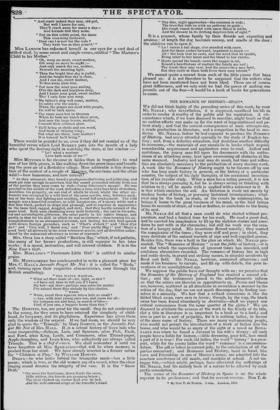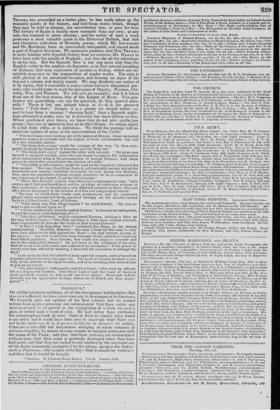THE ROMANCE OF HISTORY—SPAIN.
WE did not think highly of the preceding series of this work, by poor Mr. NEELE ; who nevertheless, it is supposed, sacrificed his life in order to render it worthy of the public and his reputation. A cir- cumstance which, if we were disposed to moralize, might teach us that no sudden efforts can make up for the want of long-continued and pa- tient study ; and that the natural consequences of such attempts are, a crude production in literature, and a congestion in the head in me- dicine. Mr. NEELE, before he had engaged to produce the Romance of History, had never attended specially to the study of English his- tory ; and, from a defective education, had doubtless another difficulty' to overcome,—the materials of our annals lie in books which require considerable acquirement and application even to read. Ardent and ambitious, the young man fell upon his documents with the enthu- siasm of an attacking army, bent upon overcoming all obstacles at the same moment. Industry and zeal may do much, but time and reflec- tion are absolutely necessary to the production of every sterling work. A work like the Romance of History ought to be thrown off by one who has long made history in general, or the history of a particular country, the subject of his daily thoughts, of his occasional investiga- tion, of his regular study. When a man has a ruling pursuit, it is not that he is always pursuing it, but he is always acting or thinking with relation to it ; all he meets with is applied with a reference to it. It is this which enriches the soil. An historian is made not merely by reading books of history, or pursuing historical investigations ; what- ever may be the book he reads, or the events he contemplates, he brings it home to the great business of his mind, as the bird brings home its morsels of straw, of wool or feather, to contribute to the lining of its nest.
Mr. NEELE did all that a man could do who started without pre- paration. and had a limited time for his work. He read a great deal, and he exerted his imagination to fill up the skeleton stories and anec- dotes he met with in the chronicles; but still his work was the crea- tion of a hungry mind. His inventions flowed scantily; they wanted the complexion of the times ; they were stiff and poor ; in short, they were destitute of the natural warmth of ripe and well-supplied genius. Besides this, there was a fault in the plan on which Mr. NEELE pro- ceeded. The "Romance of History" is not the fuble of history,—it is not that which the superstition of ignorant times has invented, and credulous chroniclers recorded. The romance of history lies in high and noble deeds, in grand and striking scenes, in singular accidents by flood and field. Mr. NEELE, however, conceived otherwise ; and made it his business to narrate, and fill up with details, the poor in- ventions of an unenlightened age. We suppose the public have not thought with us ; we perceive that the Romance of the History of England has reached a second edi- tion; and the testimonies joined to the advertisements inform us that the critics are likewise in opposition to us. Praise and blame are, however, scattered in all directions in so reckless a manner by the critics of the day, that we are not much discomposed by finding our- selves in a minority. We fear that a critical conscience is like the fabled black swan, rara avis in terris ; though, by the way, the black swan has been found abundantly in Australia—shall we expect our critical consciences from the same quarter of the globe ? We are disposed to attribute the success of the work to the felicity of its title, (for a title in literature is as important to a book as to a lord,) and also in part to a sort of prejudice, for it is nothing better, in favour of the mere name of history. There are many well-meaning people, who would not permit the introduction of a work of fiction into the house, and who would be as angry at the sight of a novel as BONA- PARTE was when he found a Juvenal in his wife's library : all such people have a foible for history,—little dreaming, poor folk, how small a part of it is true ! For such old ladies, the word " history" is a pass- port, while for the young ladies the word "romance" is a recommen- dation. The pill is taken in currant-jelly, to the satisfaction of all the parties concerned ; and Romance and History, hand in hand, like Love and Friendship in one of MOORE'S songs, are admitted into the sanctum sanctorum of old maids, and maidens at school. A not un- happy fate,—which might, perhaps, have alleviated the sufferings of Mr. NEELE, had his malady been of a nature to be affected by such gentle consolation. The series of the Romance of History in Spain is on the whole superior to its predecessor; and that for several reasons. Don T. de
* By Bon T. de Trucha, 3 volts, London,
TRUEBA has proceeded on a better plan he has really taken up the romantic points of the history, and told those stories which, though they may be wild or strange, are nevertheless true, or pass for true. The history of Spain is luckily more romantic than our own ; at any rate, the romance is more obvious ; and the writer of such a work possesses a most valuable guide in the Historical Ballads, that rich and charming collection of Homeric poems, which Mr. LOCKHART and Dr. BOWRING have so successfully interpreted, and almost made a part of English literature. We moreover perceive, that Don TRUEBA is more familiar with Spanish history than we conceive Mr. NEELE to have been with the annals of England ; and thus far all the advantage is on his side. But the Spanish Don is not any more able than the English writer in the analysis of character, or in that natural moulding of dialogue, that easy expression of passion or feeling, which are ab- solutely necessary in the composition of similar works. The style is stiff, pitched at an unnatural elevation, and bearing no signs of life beyond a solemn and stately march. We may illustrate our notion of it by saying, that it resembles a conversation between allegorical per- sons, who would come to read the dialogues of Dignity, Passion, Chi- valry, War. and Treason. We will give an example ; and it is taken from one of the best stories, that of the Knight of Bivar. Two gen- tlemen are quarrelling—we ask the question, do tbey quarrel natu- rally ? There is but one natural touch in it—it is the pleasant touch, " Take that ;" though, it is a phrase we should rather ex- pect to hear from a carrnan "showing fight," than a Spanish noble- man advanced in years, who, he it observed, has been talking so fine. When gentlemen give blows, we know they do not give gentle lan- guage—they are as natural in that as in. other things: we simply object to a fall from stilts—it is ridiculous. We think the passage will re- mind our readers of some of the conversations of the Critic.
"Two noblemen were corning out of the palace at Burgos, whose animated gestures seemed to intimate that the subject of their conversation was not of a very amicable nature.
"'The King doth wrong,' quoth the younger of the two, in thus arro- gantly treating the Emperor of Germany and the Holy See.' " The King doth right,' replied the other with warmth. No terms can be bold or arrogant enough, when they are meant to express the indignation of an independent King at the presumption of foreign Princes, who claim power to whi Oh they cannot have the shadow of a title.'
" Yet a little gentle courtesy might be used on the occasion,' returned the first speaker. But you, Don Diego Laynez, will naturally enough defend the sentiments and manner exhibited in council by your young son Rodrigo, who, upon the reputation of great courage, presumes to be as competent as any experienced greybeard, to advise hit sovereign.'
" Senor Don Gomez,' replied Don Diego in a contemptuous tone, fully certain am I that greybeards have not the privilege of conferring wisdom on their possessors, or we should see a very different conduct in those who can offer advice derogatory to the honour of a free and independent nation.' "The tone in which these words were pronounced, and the expressive glance which accompanied them, operated strongly on the already excited feelings of Don Gomez, Lord of Gormaz.
" What mean you, Don Diego Laynez?' he cried fiercely. Do you in- tend to put an affront upon me ?'
" I never condescend,' proudly replied Laynez, to become an interpreter, to suit the narrow understandings of—' "'Take that, old dotard,' angrily exclaimed Gormaz, striking a blow on the face of Don Diego,—' take that, and learn a little more wisdom yourself, than imprudently to provoke the wrath of Don Gomez Gomez!
" 'A blow ! a vile degrading blow exclaimed Don Diego in the utmost consternation. Merciful Heavens ! why have I lived till this hour ?—why have I not fallen in the field against the Moor 1—by foul treason, poison, or the plague ? Any fate would have been welcome which could have saved me from this degradation. Don Gormaz, how could you disgrace yourself and me in this unknightly fashion ? Do you trust in the weakness of my arm, bent down as I am with years, and exhausted by infirmities ? If the power to resent your base affront be wanting, I have still the resolution to attempt the deed.'
"As he spoke he laid his enfeebled hand upon his weapon, and advanced in a hostile manner towards his aggressor. The Lord of Gormaz laughed scorn- fully at the attitude of the aged cavalier, and in an insulting tone desired him to put up his sword.
" No, false knight indignantly cried Don Diego, after such an affront, life is a disgraceful burthen. Don Diego Laynez and the Lord of Gormaz must not both remain in this world one hour longer. Draw and defend yourself, ere my aggravated feelings induce me to attack you thus unpre- pared.'"



















 Previous page
Previous page